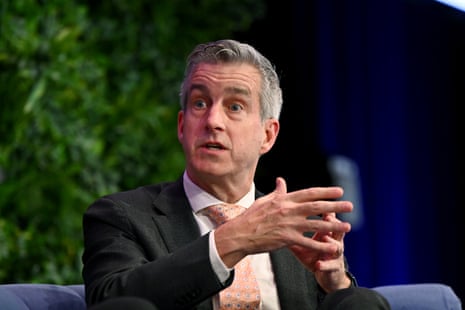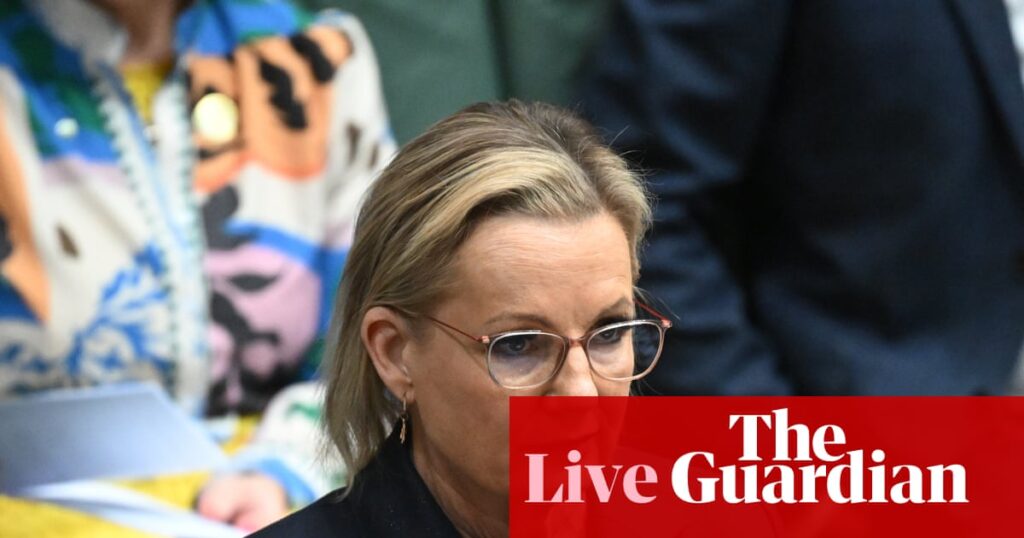Hands off the nation’s $4.2tn super pool, boss warns governments

Tom McIlroy
The boss of Australia’s biggest superannuation fund says it would be “a disaster” if governments started directing investments from the country’s $4.2tn retirement savings pool.
AustralianSuper chief executive, Paul Schroder, will address the National Press Club in Canberra today, speaking about superannuation’s role in national renewal.
Schroder will say super funds should be involved much earlier in discussions with governments about the assets they build and run, so investment opportunities which meet a national or community need are identified.
The treasurer, Jim Chalmers, has pushed super funds to send capital towards opportunities that are in “the national interest”. He wants backing for “big national priorities” such as housing and infrastructure.

Key events
The globe is grappling with AI and particularly the harms of AI in generating or spreading material with child sexual abuse.
Yesterday, the government announced it would crack down on undetectable online stalking tools and “nudify” apps, as a roundtable on AI-generated sexual abuse material also took place.
Independent MP Kate Chaney – who also has a private members bill to criminalise the possession or downloading of apps that have that material – told RN Breakfast a little earlier that law enforcement agencies are “completely overwhelmed” trying to crack down on this abusive material.
Law enforcement agencies are just completely overwhelmed by the volume and the severity is getting worse as well. You know, these tools can be used to create horrendous situations that you just can’t imagine. And that desensitises offenders, which can then increase the severity of the crimes that are then committed against real children.
Nauru deal ‘wrong on so many levels’, says Wilkie
Wilkie tells RN Breakfast the legislation that removes the right to natural justice from decisions about deportations to third countries and the $400m deportation deal with Nauru has flown under the radar.
Wilkie says the bill is unjust and illegal under international law.
He also raises serious concerns about the cost of the deal – calling it a “gross misuse of public funds”.
We’re a signatory to the Rome Statute and the Rome Statute makes it quite clear that the forced removal of a category of people to a third country is a crime against humanity.
All we know is that we’re going to gift or pay Nauru $400m to take about 280 people. That’s the upfront payment. And then about $70m a year in ongoing payments. I mean, over a few years, that’s a couple of million dollars per person. And this is an outrageous misuse of money. We can have no confidence that the Nauru government will spend it in the best interest of the Nauru people.
Wilkie says he’s prepared to meet the government halfway on FoI charges
The FoI framework does need to be modernised and figure out how to deal with the system being clogged up by requests, says independent MP Andrew Wilkie.
The former whistleblower and intelligence analyst tells ABC RN Breakfast he’s “prepared to meet the government halfway” on this issue, and highlights the ability to make anonymous FoI requests as an issue.
He says there are concerns, even among senior members of the government, that foreign governments, nonstate actors or criminals could be putting in FoIs seeking information.
But – and there’s a big but – that doesn’t mean the government should charge for FoIs to combat those concerns.
We have a problem in this country where money buys power, money buys access. You know, we read about people paying to have a dinner with a minister. I mean, this is absurd. So, I, as a matter of principle, am not comfortable at all with the fact that a charge would be applied. I mean, I don’t know what the point of the charge is. Is it to help recoup the cost of satisfying the FoI or is it to set up a barrier almost that it might stop just vexatious or silly FoI requests. But at the end of the day, everyone, no matter what their means are, has a fundamental right to access certain amounts or certain parts of government information.
He also takes a shot at the opposition, saying this “isn’t the time for a partisan response or a leftwing or rightwing response, [we need] to have an intelligent discussion of this issue”.
Ruston chastises Labor over delay to home care packages
It’s “disgusting” the government hasn’t released one new home care package this financial year, says Anne Ruston.
The Coalition with the crossbench will push amendments on aged care legislation in the Senate – that would immediately release home care packages for 200,000 elderly Australians currently waiting for one.
The shadow health minister tells ABC RN Breakfast the government has been “blaming everyone but themselves” for the delay in the legislation coming into effect, which she says shouldn’t be tied to the home care packages.
The legislation merely puts in place the new framework for how we deliver aged care into the future. There is nothing at all stopping the government from releasing packages right now. The sector is entirely able to do it. The department says they’re more than capable of getting them out the door.
The sector has also told us that they can absorb at least another 20,000 before Christmas and they can absorb the whole 83,000 that have been promised by the end of this financial year.
Ley accuses government of implementing a ‘truth tax’ on FoIs
Jumping back to Sussan Ley’s interview on Sunrise a little earlier, she accused the government of becoming “very secretive”.
Anthony Albanese said in 2019 that he was going to be transparent, and Ley says this legislation is a “broken promise like no other”.
We’re now seeing the hatches close, the lights go off and secrecy reign in the areas that the public has every right to expect transparency and truth. I’m calling it a truth tax.
To actually allow the government to be interrogated on why it does what it does and the background of the decisions that it makes, and the frank and fearless advice that it receives from its public servants, for example, they’ve they’ve told us things about what they really thought about Labor’s bulk-billing plans, about whether the sector was ready for the changes to the NDIS, and a whole lot more – this should be in the public domain.
Rowland denies government trying to put more information out of public’s reach
So what about the Albanese government’s promise that it’s open and transparent?
Rowland tells ABC AM the Labor government isn’t one “that has secret ministries”. She also says the bill will clarify the scope of various exemptions that can be used to reject FoI applications.
As we found out through robodebt, which was another example of a lack of transparency which cost people lives under the previous government, just labelling something cabinet in confidence does not make it so and we intend to enshrine that in this law.
Rowland rejects that the government is trying to put more information out of the public’s reach, and says the regime is stuck in the 1980s – at the time it was created.
We’ve had cases where FoI requests have been generated, sometimes around 600 of them in one instance, going to a small agency, which tied up the services of that agency for over two months. Now, you might think that’s not important, but let me tell you what that agency was. That was eSafety. That is an organisation responsible for ensuring the safety, particularly of young people, online getting tied up, doing 600 frivolous FoI requests that they are required by law to deal with.
Asked how the government will get this legislation through the Senate when the Greens are vehemently opposed and the Coalition has heavily criticised it – Rowland says, “politics is the art of the possible”.
Attorney general defends plan to charge for FoI requests
The government is being forced to justify and defend its announcement that freedom of information requests will be charged. The opposition has already called it a “truth tax” and hammered Labor for talking a big game on transparency.
The attorney general, Michelle Rowland, is on ABC AM, says there’s not a stakeholder who will say that the FoI regime is “working as it should” – because requests can be made anonymously, and she claims there are vexatious or frivolous requests that are trying up “scarce government resources”.
She argues that other states and territories already do it:
I would point out that there is currently a charging regime in the Freedom of Information Act, and every state and territory bar the ACT actually imposes a modest application fee of somewhere between $30 and the mid-50s.
Rowland says 70% of FoI requests are from individuals seeking access to their own personal information, and promises they will be exempt from any charges.
She also says the the legislation will be referred to a Senate committee for “debate and ventilation”.
Government must do more to ‘de-radicalise’ and ‘de-escalate’ extremist movements, says Sussan Ley
Sussan Ley “felt sick” watching a neo-Nazi confronting Victorian premier Jacinta Allan at a press conference yesterday, she tells Sunrise.
The opposition leader says she’s concerned about an escalation in hatred and intimidation seen by some at the rallies over the weekend.
The government needs to do more to “de-radicalise” and “de-escalate” these extremist movements, she says:
This sickness has to be it has to be removed. We need to de-radicalise de-escalate, work together as a society to tackle something that I’m seeing as a troubling trend, an escalation in political violence.
Anti-immigration sentiment was at the heart of these rallies. Asked whether the opposition attacking the government’s migration program is fuelling the extremists, Ley says the Coalition is pointing out that thee needs to be a “sensible, balanced approach” to migration.
We also know that by bringing in a million migrants over the first two years of this government, with no plan to house them, or to put the infrastructure in place to support them …
I speak to Australians who can’t find homes, who are taking three times as long for their commute to work, who see the pressure on infrastructure all around them every day. And they want to know that we do have balanced migration program. It’s been rushed and chaotic.
What is the balance? Ley says the number should be lower than what the government has announced – which was a permanent migration intake of 185,000 over this financial year.

Sarah Basford Canales
Chris Sidoti also suggested there were double standards when it came to governments enforcing domestic law as opposed to international law.
He said:
A sovereign citizen killing cops is no different from the leader of a sovereign state killing kids. The crime is the same. The criminality is the same. What is different is the response.
Sidoti outlined a review of Australia’s engagement with Israel following the ICJ’s ruling could result in trade sanctions with military suppliers within, and to Israel, personal sanctions against military and political members engaging in alleged war crimes and human rights abuses as well as the prosecution of any Australians who served in the Israeli defence force after 7 October 2023 for war crimes and crimes against humanity.
He concluded:
What is the alternative to a functioning international legal system? The only alternative is that might is right. The law of the jungle. The replacement of a rules-based international order with a fools-based international order. International law and the international legal system are the only thing standing between us and the abyss.
Former human rights chief Chris Sidoti urges Australia to take stronger action against Israel

Sarah Basford Canales
Former human rights commissioner Chris Sidoti has urged Australia to respond with action, not “pious expressions of support”, to the international court of justice’s decision last year that a number of Israel’s activities in Gaza and the West Bank amounted to breaches of international law.
In an event addressing some Labor and crossbench MPs and senators at Parliament House on Tuesday afternoon, Sidoti said Australia should have announced a review of its ties to Israel following the ICJ’s provisional finding in July 2024 to ensure Australia was meeting its international obligations.
The ICJ found multiple breaches of international law by Israel, including activities that amounted to apartheid. It ordered Israel to end its occupation of the Palestinian territories as rapidly as possible and make reparations for “internationally wrongful acts”. The Israeli government derided the findings at the time as a “decision of lies” by The Hague.
Sidoti, who was until recently one of three members of a UN commission of inquiry into human rights in Israel and the occupied Palestinian territories, said maintaining international rules-based order required third countries, like Australia, to respond to breaches of the law with action, not “pious expressions of support”.

Krishani Dhanji
Good morning,
Krishani Dhanji here with you, thanks to Martin Farrer for getting us started.
It’s going to be another busy day in parliament today, we’re likely to see more debate on the aged care bill in the Senate – which the government has been feeling the heat on from the opposition and crossbench.
We’ll also likely get more reaction to the rallies over the weekend – after the PM told his partyroom the government needs to give people “space” to avoid going down dangerous rabbit holes, and one MP questioned his claim that “good people” were at that rally. You can read more on that story from my colleagues here.
Let’s get stuck in!
ADF troops join hunt for Dezi Freeman, says Marles
Troops from the Australian defence force have joined the search for Dezi Freeman in Victoria’s north-east a week after the fugitive allegedly shot two police officers, the deputy prime minster, Richard Marles, confirmed.
Speaking to ABC’s 7.30 last night, Marles – who is also the minister for defence – said the ADF had provided a planning specialist and air surveillance assets following a request from Victoria police.
“The Australian defence force will work with the Victorian police as they request our assistance in terms of the particular assets and capabilities that we have to bring Dezi Freeman to justice,” Marles told Sarah Ferguson.
Separately, the deputy PM told the program he “fully expects” the Australian government will meet with US president Donald Trump “in the not-too-distant future”, describing a “sense of optimism” about the alliance.
Marles met with Trump’s right-hand man, US vice-president JD Vance, and US counterpart Pete Hegseth last week to discuss the bilateral economic relationship, critical minerals, national security and Aukus.
US defence officials initially denied the Australian defence minister and US counterpart had met during the last-minute trip to Washington, but later clarified a meeting had indeed taken place.
“Ours is a relationship where we feel a sense of optimism about how we can manage the alliance with the Trump administration and indeed the meetings I had last week only affirmed that,” Marles told 7.30.

Tom McIlroy
AustralianSuper is the country’s largest super fund. It has more than 3.6 million members and $385bn in funds under management.
“I’ve said this behind closed doors and in front of the cameras and I’ll say it again: it would be a disaster for members if governments tried to tell us what to invest in,” Schoder will say in the speech.
“Members carry the investment risk, and it is their money.”
He says governments can build assets, with the plan to sell or lease them later to long-term investors such as super funds. But he warns part of government’s role is to build things that are important for the country but which don’t necessarily make the kind of financial return super funds need.
“We must break the piggy bank mentality,” Schroder says.
“Super is not a trillion-dollar fix-all. It cannot – and should not – be used to solve every complex national problem.”
Hands off the nation’s $4.2tn super pool, boss warns governments

Tom McIlroy
The boss of Australia’s biggest superannuation fund says it would be “a disaster” if governments started directing investments from the country’s $4.2tn retirement savings pool.
AustralianSuper chief executive, Paul Schroder, will address the National Press Club in Canberra today, speaking about superannuation’s role in national renewal.
Schroder will say super funds should be involved much earlier in discussions with governments about the assets they build and run, so investment opportunities which meet a national or community need are identified.
The treasurer, Jim Chalmers, has pushed super funds to send capital towards opportunities that are in “the national interest”. He wants backing for “big national priorities” such as housing and infrastructure.
Welcome
Good morning and welcome to our live politics blog. I’m Martin Farrer with the best overnight stories before Krishani Dhanji takes the controls for the bulk of the day.
The boss of Australia’s biggest superannuation fund will warn today that it would be “a disaster” if governments started to try to dictate how the industry invests its $4.2tn retirement savings pool. In a speech to the National Press Club later today, AustralianSuper chief executive, Paul Schroder, will say the super pot is not a “fix-all” for the nation’s problems. More coming up.
The army has joined the search for the Porepunkah shooting suspect, Dezi Freeman, Richard Marles told ABC’s 7.30 last night, providing a planning specialist and air surveillance help following a request from Victoria police. It comes as an expert on the terrain says Freeman could be evading police heat detection devices by hiding in the area’s disused mines. More details shortly.
The former human rights commissioner, Chris Sidoti, has urged Australia to take stronger action against Israel after the ICJ’s ruling last year that it had acted illegally against the Palestinian people. Sidoti told Labor MPs yesterday that the government must do more than offer “pious expressions of support”.

